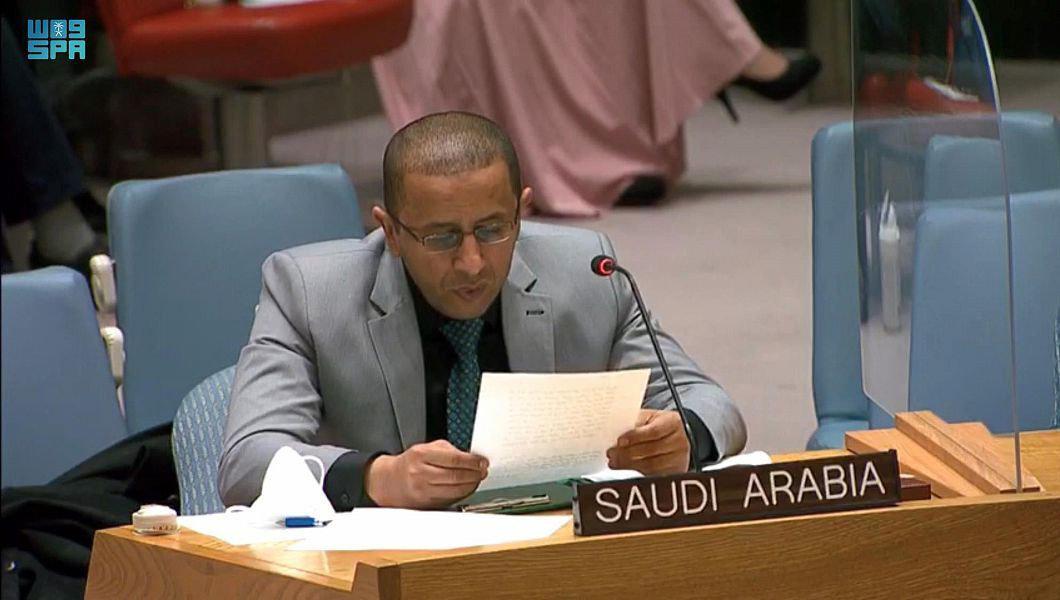NEW YORK: The failure of the international community to take decisive action to address the terrorist activities of the Houthis in Yemen has emboldened the Iran-backed militia to attack the Yemeni people and threaten peace and security in the region and beyond, Saudi Arabia’s deputy permanent representative to the UN said on Wednesday.
Mohammed Abdulaziz Alateek told the Security Council that the Kingdom reserves the right to “take any necessary measure in line with international law” to respond to Houthi aggression. It came two days after a deadly attack on neighboring Abu Dhabi by the militia.
The envoy said authorities in the UAE have the full support of the Kingdom “as they address any threat to their stability and security,” and called on the international community “to confront the terrorist Houthi militias.”
The ministerial-level meeting was convened by Norway, which holds the presidency of the Security Council this month, to discuss the situation in the Middle East, including the Palestinian question.

Saudi Arabia’s deputy permanent representative to the UN Mohammed Abdulaziz Alateek. (SPA)
Alateek said that Tehran provides support to the Houthis “day after day” and added: “These terrorist militias continue to disregard the aspirations of the Yemeni people and to threaten regional and international peace and security.
“A case in point is their violation and threats to international navigation and their use of civilian facilities and Yemeni ports to undermine regional security and attack civilians in Saudi Arabia and the UAE.”
On Monday this week, three people were killed and six injured by a drone strike on a key oil facility in the Emirati capital, and a separate fire was sparked at Abu Dhabi’s international airport. The Houthis claimed responsibility for the attacks, which immediately drew condemnation worldwide.
Last Friday the Security Council unanimously condemned another hostile Houthi act, the seizure on Jan. 3 of the UAE-flagged ship Rwabee in the Red Sea off the coast of Yemen and the detention of its crew.
In a statement drafted by the UK, council members demanded the immediate release of the vessel and those on board, and urged the Houthis to guarantee the safety and well-being of the crew.
Civilian targets in Saudi Arabia have also repeatedly come under attack from Houthi-launched drone and missile strikes.
Highlighting the Saudi peace initiative to end the conflict in Yemen, Alateek called on the international community and the Security Council to “take all necessary measures against these terrorist militias that obstruct peace and any attempt to reach a political solution sponsored by the UN in line with resolution 2216, the Gulf Initiative and the outcome of the National Dialogue.”
Turning to the crisis in Lebanon, Alateek reaffirmed Saudi Arabia’s support for the people of the country and urged Lebanese authorities to prioritize “their people, to meet their aspirations for security, stability and well-being, and to end terrorist Hezbollah’s control of the state.”
Regarding the Palestinian question, Alateek said Riyadh remains committed to ending the occupation, the establishment of an independent Palestinian state with Jerusalem as its capital, and ensuring Palestinian refugees can return home.
“We stress that comprehensive and lasting peace in the middle East is a strategic choice to end one of the most protracted conflicts in our modern history, based on the two-state solution and international terms of reference, as well as the Arab peace initiative of 2022,” he said.
“All these initiatives call for the establishment of the Palestinian state along the borders of June 4, 1967, with Jerusalem as its capital, the return of refugees, and an end to the Israeli occupation of all Arab territories, including the Syrian Golan and Lebanese territories.”
Alateek accused Israel of continuing “to violate international laws and norms in the Occupied Palestinian Territories, committing the most heinous forms of injustice and aggression against the Palestinian people.”
He called on the Security Council and the wider international community to assume their responsibilities toward Palestinians by “ensuring justice,
achieving the aspirations of the Palestinian people to establish their own independent state as guaranteed in international laws, and deal firmly with the Israeli violations of international law and relevant UN resolutions.”



























